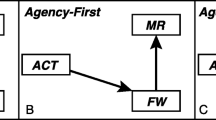Abstract
In Manipulated Agents: A Window to Moral Responsibility, Alfred Mele invokes radical reversal cases in which one agent is covertly manipulated to be just like another agent in relevant respects to defend a version of the following “externalist” thesis: how agents acquire their springs of action, such as desires and beliefs, bears on whether they are morally responsible for their actions. I assess proposed rationales for the crucial verdict that agents in such cases are not responsible for their germane actions. I argue for the superiority of Mele’s rationale and propose that these cases also support accepting an externalist constraint on other normative appraisals, such as those of practical rationality. Key words: Moral obligation; practical rationality; radical reversal cases; ultimate origination; zygote argument.
Similar content being viewed by others
Notes
Mele (2019), 6.
Mele (2019), 14–15.
Mele (2019), 48–49.
Specifically, Mele defends what he calls “conditional externalism” (2019, 13–14).
E.g., Haji 1998, 115–22.
Mele (2019), 86.
McNamara (1996), 424–426.
E.g., McNamara (2011).
Mele (2019), 26.
Pereboom (2001), 4, 43.
Perhaps a qualification is apposite: I should have said “my gut-reaction intuitions.” My hope is that at least some readers will share this intuition.
Among these other conditions may be the condition that an action for which you are responsible is indeterministically caused.
See, e.g., Kane (1996), 33–37.
Kane (2014), 180–181.
E.g., Haji (2019), 27–31.
Kane (2014), 186.
Kane (2014), 184.
Mele (2019), 102, 107.
Mele (2019), 110.
A reminder: both responsibility compatibilists and responsibility incompatibilists may have this intuition.
Frankfurt (2002), 27.
Mele (2019), 76.
Feldman (1986), 16–18.
Feldman (1997), 63.
Feldman (1997), 164.
Feldman (1997), 166. To save space, I set aside desert principles concerned with negative primary things.
I have in mind desert claims in which the deserver is an agent. A beautiful painting can deserve admiration.
The responsibility at issue is “normative” (like being morally or skills-wise responsible) and not merely causal.
I leave this exercise up to you, the reader.
Mele (2019), 39.
References
Alfred Mele, Autonomous Agents (New York: Oxford University Press, 1995).
Alfred Mele, Free Will and Luck (New York: Oxford University Press, 2006).
Alfred Mele, “Moral Responsibility: Radical Reversals and Original Design”, Journal of Ethics 20 (2016): pp. 69–82.
Alfred Mele, Manipulated Agents: A Window to Moral Responsibility (New York: Oxford University Press, 2019).
Bradford Skow, (2012.) “How to Adjust Utility for Desert”, Australasian Journal of Philosophy 90 (2012): pp. 235–57.
Derk Pereboom, Living Without Free Will (Cambridge: Cambridge University Press, 2001).
Derk Pereboom, Free Will, Agency, and Meaning in Life (New York: Oxford University Press, 2014).
Fred Feldman, Doing the Best We Can (Dordrecht: D. Reidel Publishing Company, 1986).
Fred Feldman, Utilitarianism, Hedonism, and Desert (Cambridge: Cambridge University Press, 1997).
Frankfurt, Harry G Frankfurt, “Reply to John Martin Fischer”, in S. Buss and L. Overton (eds.), Contours of Agency: Essays on Themes from Harry Frankfurt (Cambridge, MA: MIT Press, 2002), pp. 27-31.
Ishtiyaque Haji, Moral Appraisability: Puzzles, Proposals, and Perplexities (New York: Oxford University Press, 1998).
Ishtiyaque Haji, The Obligation Dilemma (New York: Oxford University Press, 2019).
Michael J. Zimmerman, The Concept of Moral Obligation (Cambridge: Cambridge University Press, 1996).
Paul McNamara, “Making Room for Going Beyond the Call”, Mind 105 (1996): pp. 415–50.
Paul McNamara, “Supererogation, Inside and Out: Toward an Adequate Scheme for Common-sense Morality,” in Mark Timmons (ed.), Oxford Studies in Normative Ethics, Volume 1 (New York: Oxford University Press, 2011), pp. 202–35.
Robert Kane, The Significance of Free Will (New York: Oxford University Press, 1996).
Robert Kane, “New Arguments in Debates on Libertarian Free Will: Responses to Contributors,” in D. Palmer (ed.), Libertarian Free Will (New York: Oxford University Press, 2014), pp. 179–214.
Ryan Herbert, Teleologism Full Stop: A General Theory of Ability, Agency, Know How, Obligation, and Justification. PhD dissertation, University of Calgary, 2016.
Acknowledgements
This paper was completed during my tenure of a 2017–2021 Social Sciences and Humanities Research (SSHRC) grant. I thank this granting agency for its support.
Funding
This paper was completed during my tenure of a 2017–2021 Social Sciences and Humanities Research (SSHRC) grant. I thank this granting agency for its support.
Author information
Authors and Affiliations
Corresponding author
Additional information
Publisher's Note
Springer Nature remains neutral with regard to jurisdictional claims in published maps and institutional affiliations.
Rights and permissions
About this article
Cite this article
Haji, I. Radical Reversal Cases and Normative Appraisals. Criminal Law, Philosophy 15, 271–284 (2021). https://doi.org/10.1007/s11572-020-09558-1
Accepted:
Published:
Issue Date:
DOI: https://doi.org/10.1007/s11572-020-09558-1



